[Published on
Cinescene.]
 CÉCILE DE FRANCE IN XAVIER GIANNOLI'S THE SINGERTHE RENDEZ-VOUS WITH FRENCH CINEMA AT LINCOLN CENTER 2007 Every year at in New York Unifrance and the Film Society of Lincoln Center present fifteen or so new French films, a cross section of what's coming out in France both with and without US distributors. Some are mediocre, some are good, some great. Here are ones that stood out this time. All are marked by an original and dedicated vision, and as with any preeminent film culture, France has great actors. France is the leading producer of luxury products in the world – couture, wine, cognac, aircraft, cosmetics, jewels. Maybe we should start to recognize that French cinenma is another of the country's luxury products.
CÉCILE DE FRANCE IN XAVIER GIANNOLI'S THE SINGERTHE RENDEZ-VOUS WITH FRENCH CINEMA AT LINCOLN CENTER 2007 Every year at in New York Unifrance and the Film Society of Lincoln Center present fifteen or so new French films, a cross section of what's coming out in France both with and without US distributors. Some are mediocre, some are good, some great. Here are ones that stood out this time. All are marked by an original and dedicated vision, and as with any preeminent film culture, France has great actors. France is the leading producer of luxury products in the world – couture, wine, cognac, aircraft, cosmetics, jewels. Maybe we should start to recognize that French cinenma is another of the country's luxury products.
The Rendez-Vous with French Cinema runs at the IFC Center and at Lincoln Center in New York from February 28 to March 11, 2007.Julie Gavras: Blame It on Fidel/La faute à Fidel (2006)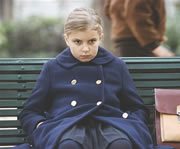 NINA KERVEL-BEY
NINA KERVEL-BEYFormer documentary filmmaker Gavras probably inherited her political awareness through her father, the Costa-Gavras of
Z and
State of Siege, but she's expressed a woman's point of view toward politics by choosing a subject that deals with its effect on a family. The film is bright and entertaining and has some good laughs. But it deserves extra credit for having a good head on its shoulders at all times. Blame It on Fidel deals with how children may be victimized by the ideas of their parents, even when those ideas are well-meaning and progressive. The film comes up with the startling revelation that a nine-year-old can seriously engage with issues like abortion and capitalism vs. communism. When young Anna sees her parents' get involved in political activism in the early seventies and abandon their comfortably bourgeois lifestyle, she doesn't take it sitting down. Instead she engages tooth and nail with the ideas her parents are indirectly imposing on her -- the importance of group action, the injustice of a market economy, etc. She thoroughly enjoyed the perks and rituals of a comfortable bourgeois life; and catechism, which she's been taken out of in Catholic school, was one of her best and favorite subjects. She loved her anti-Castro Cuban nanny and thought her conservative grandparents (her mother's parents, heirs to a Bordeaux vineyard) had their own worthwhile ways of doing good. (And they did, but they didn't disturb the existing social order as her father Fernando's Chilean activist friends want to do.) At first, amusingly, the feisty, impulsive little François, Anna's younger brother, is better at adjusting to the changes, to sleeping in the same bedroom and eating exotic food prepared by their new political refugee nannies from Greece and Vietnam. In the end though, Anna has come to terms with the principle of change, and it's she who insists on being transferred to a secular school that's multicultural and free-wheeling, and she's happily joining in the play there at recess time as the film ends. This isn't a story of a child passively witnessing traumatic political events. Instead it's an illustration of the fact that kids can think. And this film that might have been solemn and self-conscious given some of the subject matter instead is a light-hearted comedy that's also beautiful to look at.
No US distributor. Christophe Honoré: Inside Paris/Dans Paris (2006) 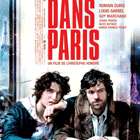
After the turn-off of his previous
Ma Mère and the gloomy intensity of previous films, Christophe Honoré has produced a fourth feature that's economical and entertaining, a remarkable balance of moods that (as before) studies parental and sibling relationships, this time with elegant dialogue and amusing contrasts of scenes and characters and an evocation of the French New Wave that gives two of France's best and hottest young male film actors a chance for virtuoso performances. Romain Duris is an older brother returned to his father's Paris flat suffering from a heavy depression in the wake of a failed marriage. Louis Garrel is his spunky, playful younger sometime student brother who has yet to leave the parental nest, and Guy Marchand gives a winning performance as their father trying to create equilibrium in this bipolar family situation at Christmastime. One of France's hippest journals,
Les Inrockuptibles, called this the best film of the year. Apart from the playfulness with film tradition, Honoré has taken a fresh look at depression that recognizes it may be interrupted by moments of hectic glee and deep self-awareness.
US distributor: IFC First Take. Olivier Dahan: La Vie en Rose/La Môme (2007) 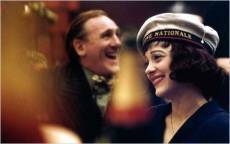 DEPARDIEU AND COTILLARD
DEPARDIEU AND COTILLARDThis biopic about the tragic, tumultuous life of French singer icon Edith Piaf, "the kid sparrow," greeted ceremonially as a "film event" in France as befits an elaboration of the history of a national treasure, is crowned with a spectacular lead performance by Marion Costillard that's at once go-for-broke and precisely accurate down to the fingernails. Whatever you may conclude about this overwhelming, chaotic film – it really doesn't want to give you time to think – you're going to grant that Cotillard delivers one of the most remarkable star performances ever in a singer-biopic. "The narrative had to be impressionist, not linear," Dahan has commented. Certainly this isn't studied, analytical filmmaking but, as Dahan's remark suggests, the wildly impressionistic kind. The film shifts back and forth vertiginously between Piaf's last days – she died at 47 – and the many highlights and low points of her incredible earlier life. "This is a Kid who will make you blubber," wrote French critic Patrick Fabre after
La Môme's Valentine's Day opening in Paris, "like you've never blubbered at the movies before." And this film too is beautiful and full of fine actors.
US distributor: Picturehouse.
Bruno Dumont: Flanders/Flandres (2006) 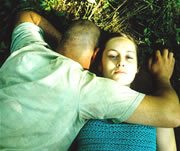
Dumont's people are laconic, his settings are remote and cheerless and his characters are played by non-actors, but the powerful filmmaking of his unique, harsh style presents a clear and moving narrative. Using simple, economical means and focusing on a few individuals, presenting scenes that follow a logical, universal progression,
Flanders is able to tell a profound story about war's ravages at home and on the front. This is classic Dumont style, if on a bolder and grander scale than before. His people are none the less noble, pathetic, and human for being reduced to simplicity, even crudity. Dumont has made a film as energetic and forward-driven as the Dardennes brothers'
L'Enfant, but more universal, and even more concise (91 rather than 100 minutes). As in Dumont's
L'Humanité and
La Vie de Jésus, there's a grandeur that emerges from the stripped-down, minimal scenes and people. Everything works. We might see a home truth in this account of young men who go off to fight in an Arab country, are led to do terrible things, suffer horribly, and come back to ordinary life shattered but more than ever in need of love. It's surprising that
Variety's usually canny reviewer made it sound dull and off-putting. There is still resistance to Dumont's style.
US distributor: International Film Circuit.Denis Dercourt's The Page Turner/Le tourneuse de pages (2006) 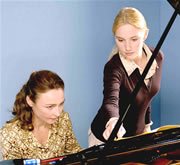 CATHERINE FROT, DÉBORAH FRANÇOIS
CATHERINE FROT, DÉBORAH FRANÇOISDirector Denis Dercourt is also an accomplished classical musician. His film combines performance anxiety with suspense as we await the unfolding of a revenge. This is the cooler side of the French personality. Dercourt's people, frustrated, demanding, nervous musicians, seem curiously wooden most of the time – like Daniel Auteuil's violin-maker character in
Un coeur en hiver, they seem to live in a continual winter of the spirit – but within the world of austere elegance and musical dedication that Dercourt creates, somehow that woodenness becomes believable and even moving. And the tension is worthy of Chabrol. Exceptional performances here by Catherine Frot as Ariane, a self-centered pianist, and Déborah Francois as Mélanie, the young student who loses a scholarship through Frot’s thoughtless behavior and gets delayed revenge. Dercourt gets deep into the myriad ways musicians may suffer – the demanding hours of practice, the merciless competition, the terrifying concert nights with their inevitable accompaniment of
'le trac' (stage fright) – and the ways that these musicians’ personal agonies may engender suffering in others. In this film, all is bright and clear on the surface, but a mere walk down a corridor to an indoor pool can be heavy with foreboding. We know that young Mélanie will bring down pianist Ariane's world, but we don't know how or where the destruction's coming: Dercourt is continually raising the tension to a tighter pitch by keeping us guessing.
US Distributor: Tartan Films. Xavier Giannoli's The Singer/Quand j'étais chanteur (2006) 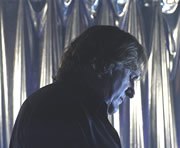 GÉRARD DEPARDIEU
GÉRARD DEPARDIEUThe French press has been understandably ecstatic about this film. It brings together one of the most distinguished and prolific actors in French cinema with one of its most luminous and vibrant young female talents. But this isn't just a film about stars and authentic-feeling chemistry. It's a film about character and situation. First and foremost it's a film about dance halls and the singers who work in them. Gérard Depardieu is the aging, almost over-the-hill Alain Moreau –"Alain Moreau et son Orchestre." Cécile de France is Marion, a fragile young woman, tough and beautiful on the outside but inside rather shattered, in a new place, Clermont-Ferrand, in a new job, selling real estate, with her young son she doesn't get to spend much time with. When they meet a transitory but transformative relationship happens.
The Singer is a film that breathes. Its beauty is that it has no easy tragedies or easy resolutions; that things are almost as uncertain between Alain and Marion at the end as they were that first night when she sat in front of him in the dance hall blonde and bright, like a diamond in a red dress. Giannoli is a young director who works with independence and drive. His
Les corps impatients was a distinctive and risk-taking film but this one is a leap forward beyond passion and conviction to larger conception, deeper commitment and broader communication. This time Giannoli has done something that can reach a lot of people. Depardieu sings his own songs, and his performance as Alain Moreau is one of the best things he's done in a long time – at least over a decade – and a great thing it is. This was a magnificent opportunity for Cécile de France and she's met it with her best and richest acting in a film to date. It's a tribute to both actors' work in
The Singer that you find it hard to separate either of them from their characters. The film ends with a song, "
Quand j'étais chanteur," ("When I Was a Singer" – the title of the film in French).
Je m'éclatais comme une bête, it goes,
quand j'étais chanteur --
I had a hell of a good time when I was a singer. The Singer is one of those films that isn't putting on a show for you: it's inviting you to come in and hang around a while, join in the dance. It moves you with performances that are authentic and direct, "as simple," as one French critic put it, "as a song."
US distributor not yet announced.




